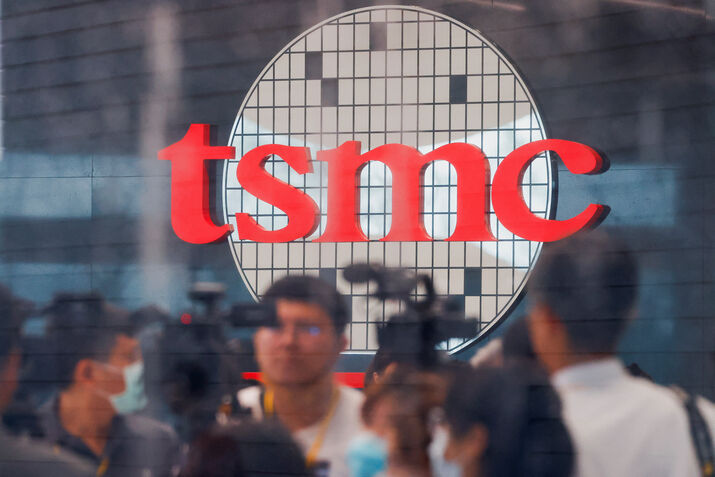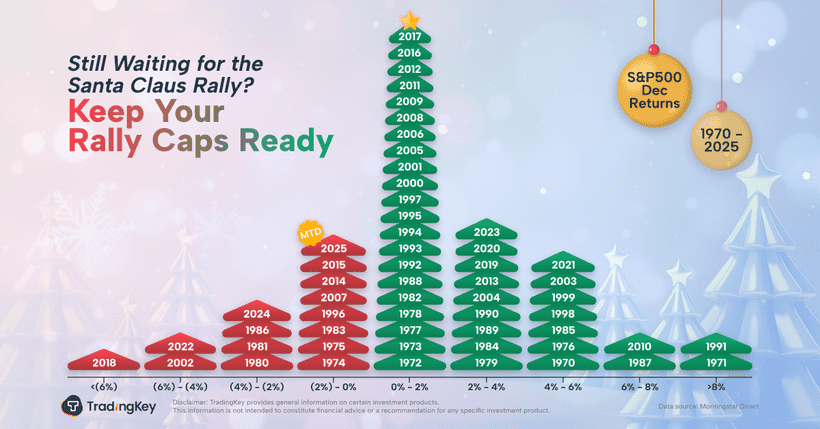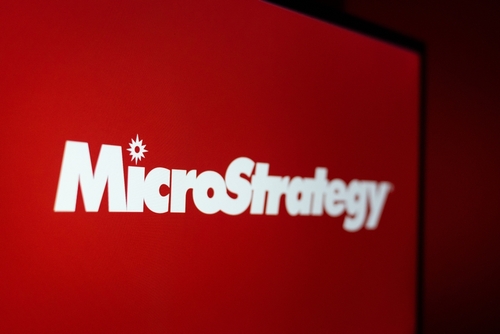Big Win for Hang Seng Index in 2024 After Years of Negative Growth: Will 2025 be Even Better?

Takeaways
- Hong Kong-listed stocks have been underperforming since 2021 due to a variety of factors. 2024 will probably end as a good year for Hang Seng Index (HSI), after several years of losses
- Investors can uncover plenty of opportunities if they identify the current macro-trends and stock-pick companies with solid business models and financials
- Even after the rally in 2024, HSI can still be considered as undervalued
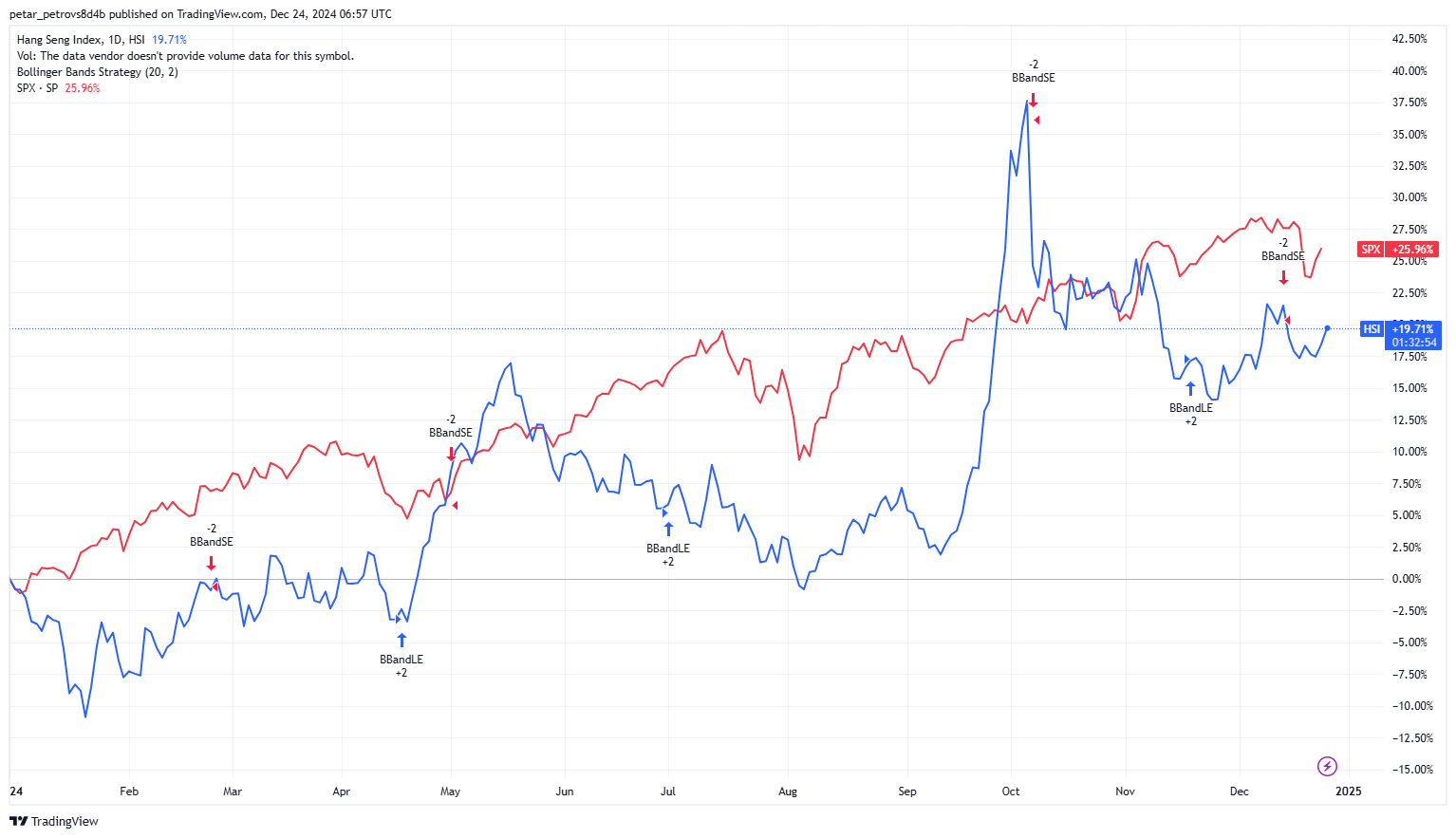
Source: TradingView
Difficult Times for Hang Seng Index
Hang Seng Index saw negative returns in four consecutive years with losses of 3%, 14%, 15% and 9%, respectively.
There are many reasons behind the underperformance, but we will not dig too deep into them now, as there is enough material written to explain them.
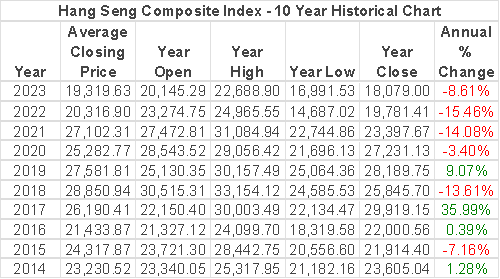
Source: Hang Seng
The picture becomes even more gloomy for investors once we compare the HSI with the stellar performance of the US equity indices (SPX, Dow, Nasdaq), as we have witnessed (and probably still witnessing) some of the greatest bull runs in the US equity history.
We believe the prospects for Hong Kong shares are still bright.
A Quiet Win for HSI in 2024
Few trading days left before the end of 2024, and the year will probably end as one of the better years for Hong Kong shares in a while. Without much media coverage around it, HSI is returning almost 20%, the first positive return since 2019.
By taking a proactive stock-picking approach, investors can discover plenty of opportunities. The following three stocks can be a good example of how by overcoming the biases and the negativity and careful stock picking, investors can unfold opportunities in the stock market of the second largest economy.
The Champions Among the HSI Constituents
Here, we would like to share about three companies from three different industries and what made them beat the market during 2024. Common aspects among these three stock leaders are 1) Capable management and execution; 2) Taking advantage of structural macro trends within the country and 3) Diversifying their revenue both in terms of product lines and geography.
Meituan (369.HK)
From 2021 through 2023, the share price of the largest food delivery player in the country suffered a lot. The main reason for the sluggish performance was the intensive competition from Alibaba and JD’s food delivery arms, as well as the new entrant in the face of Douyin. This led to an industry environment where players tried to enhance by spending generously on marketing expenses and incentives. This was not received well, as more spending harms profitability. Now the dynamic looks different, as the competition is less fierce, and market players switch their focus from fighting for market share to improving margins.
The stock price of Meituan almost doubled in 2024 due to solid earnings beats throughout the year. With a solid management execution, Meituan was able to defend its dominant market share of nearly 70%, by utilizing the macro trend of more conservative consumption with the low-priced group ordering platform Pin Hao Fan.
In addition, Meituan showed prowess with its successful expansion into overseas markets, particularly Hong Kong and the Middle East.
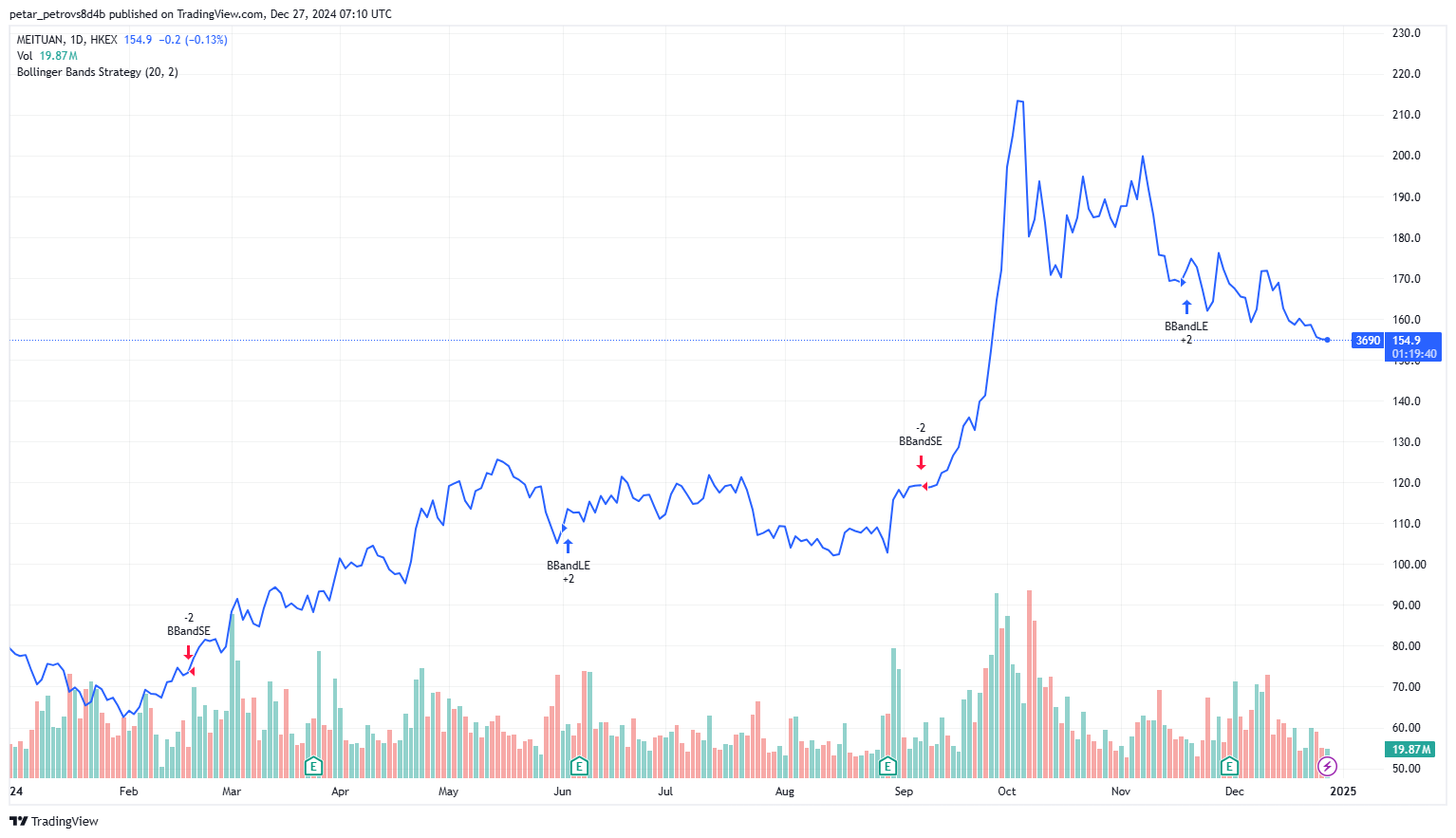
Source: TradingView
Trip.com (9961.HK)
One of the major themes recently is the rise of the so-called experience economy, where consumers pay for non-material products. Travelling and entertainment can be considered as part of the experience economy.
As the Chinese Gen Z becomes less willing to spend on luxury or property, they started to embrace the idea of travelling and experiencing the country and the world. This, combined with the post-COVID opening helped the largest online travel agent Trip.com (the owner of Ctrip and Qunar) register a remarkable rally. The company continued to do well in 2024, as the stock price surged 110%.
Similar to what we saw in Meituan, Trip.com also demonstrated a successful expansion in overseas markets with its products Trip.com and Skyscanner. The overseas opportunities for the company are significant, as the Total Addressable Market (TAM) of the rest of Asia is 1.5x that of China, but the penetration is much lower. Management expects the overseas revenue to reach nearly 20% of the total revenue in the coming years.
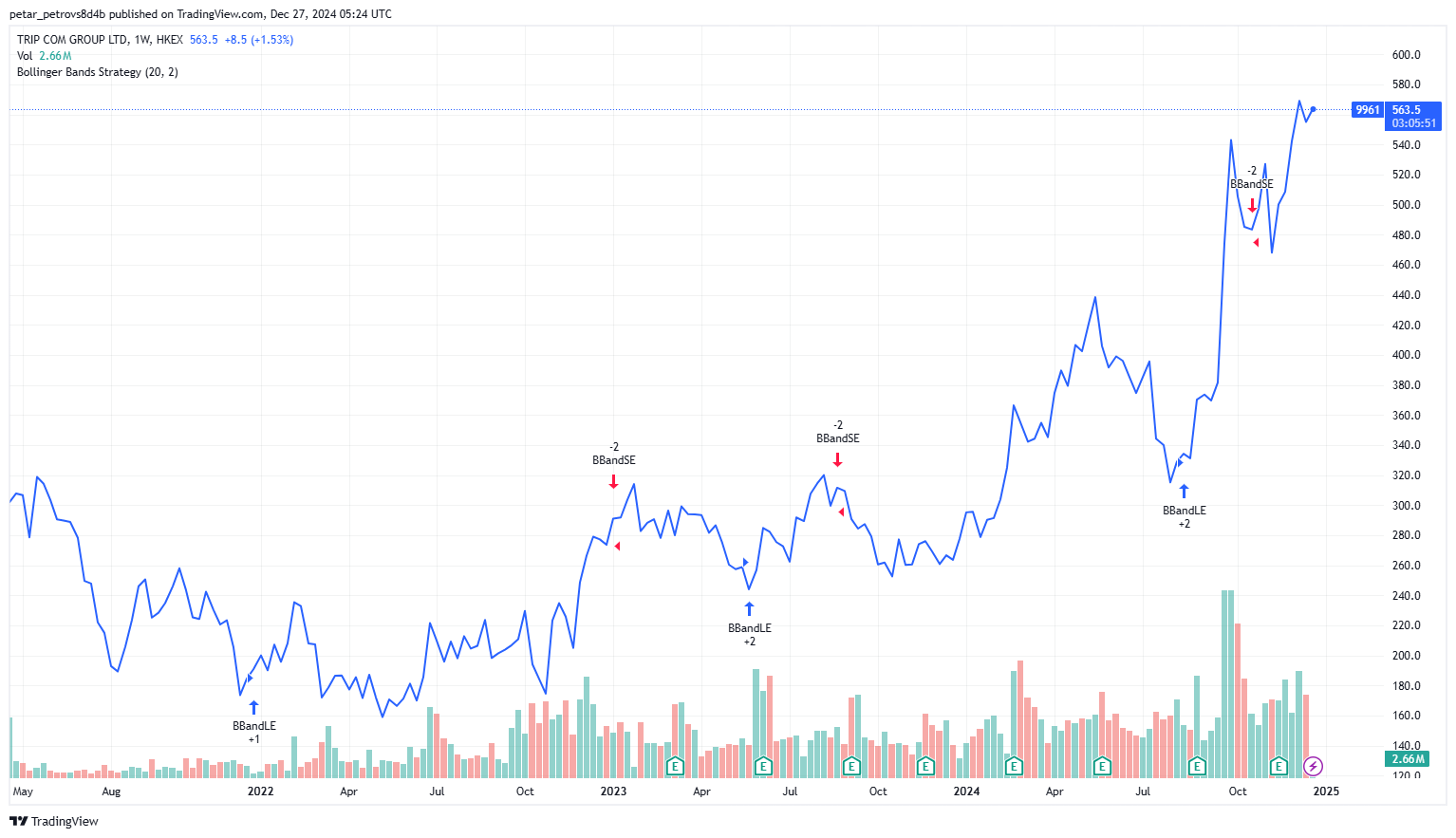
Source: TradingView
Xiaomi (1810.HK)
Two stories were going for Xiaomi this year that made the stock price go up over 120% year-to-date.
First, we have the smartphone market, where local brands, including Xiaomi, were able to take market share from Apple. Xiaomi and the other domestic smartphone makers provided good value at a reasonable price, successfully attracting the local price-conscious consumer.
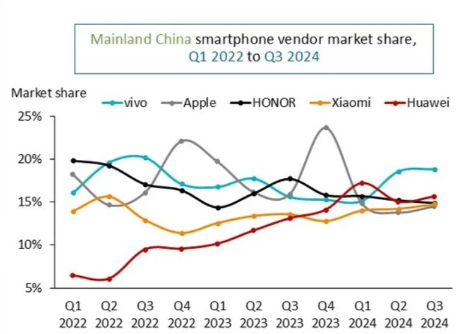
Source: Canalys, Oct 2024
Second, Xiaomi has been doing exceptionally well in its EV venture. When the company introduced this business line 2-3 years ago, many were very skeptical due to the highly competitive EV market. However, unlike the pure-play EV competitors, Xiaomi was able to leverage its experience within consumer electronics, cementing its place as a leading IoT company. Currently, the electric vehicle segment represents 10% of the total company revenue.
What Should We Expect in 2025
For 2025, HSI will still be largely affected by the government actions of tackling the country’s economy – improving the overall consumption, reviving the property sector and alleviating the local debt burden. There are enough indicators to believe that the already-announced measures will about take effect. Also, further measures will be introduced.
From a valuation perspective, HSI price-to-earnings ratio is below its 10-year historical average. Also, it trails the American peers quite significantly (10x vs nearly 30x for S&P500). Thus, the opportunities remain here after the strong performance, having a rather limited downside at the same time.
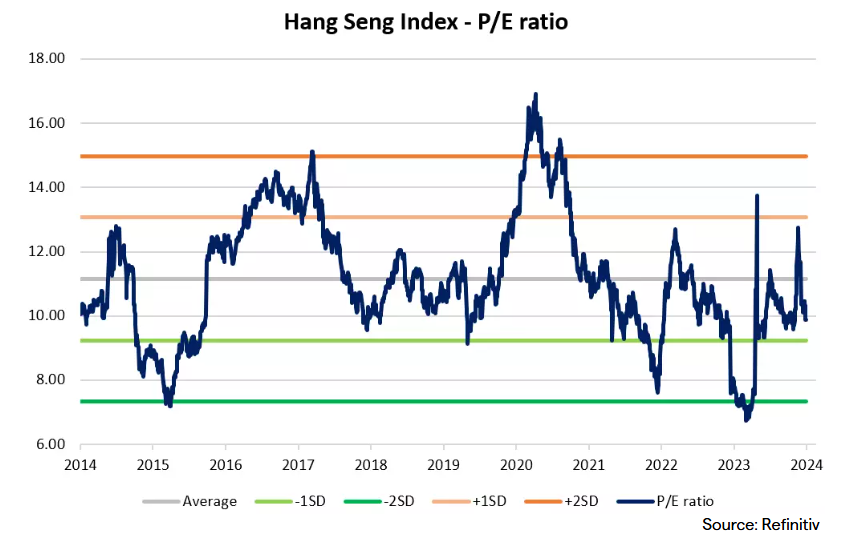
Source: Refinitiv
Conclusion
Investing in a sluggish stock market has always been a challenging task. However, even in bear cycle, investors can still unfold plenty of opportunities. In order to do this, investors should not let biases overtake their decision-making process and try their best to understand the macro-trends and evaluate companies on an individual basis.




